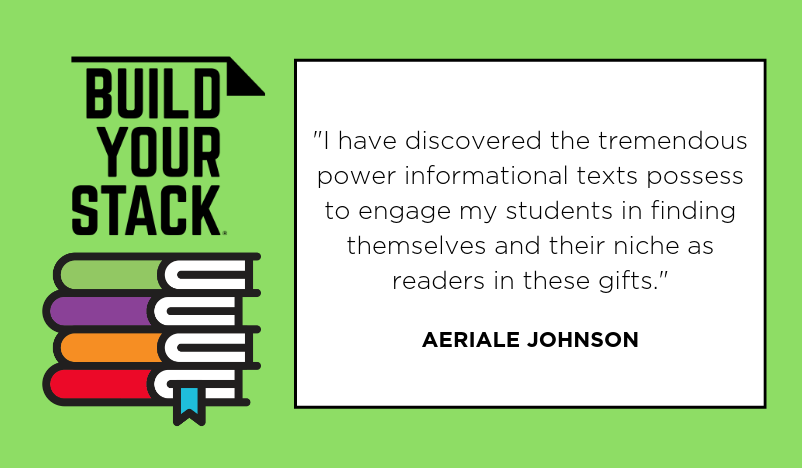This blog post is part of Build Your Stack,® a new initiative focused exclusively on helping teachers build their book knowledge and their classroom libraries. It was written by NCTE and Build Your Stack committee member Aeriale Johnson.
When we discuss diversity in the children’s book world, we almost always center narrative. If students can find themselves and others in their lives in the stories in our libraries, they will be vindicated, feel valued, and consequently develop a deeply meaningful reading life. We believe firmly in this truth.
However, I have also discovered the tremendous power informational texts possess to engage my students in finding themselves and their niche as readers in these gifts.
This school year, I have been thinking a lot about whether or not my classroom library reflects more than the visible diversity of my students. Most of my second graders are, in fact, ethnically and culturally similar. Instead, I am asking myself:
- In what ways does my classroom library reflect the diverse interests of my students?
- How does my classroom library support their inquiry into these topics?
- Do the texts I procure reflect the contributions of a broad range of humanity, including themselves, to my students’ fields of interest?
- Do the texts present counternarratives to their current understandings to help them develop more nuanced perspectives?
Earlier this school year, I was preparing to leave my classroom for a few days to present at the NCTE Convention in Houston, Texas. A small group of students wanted to learn more about where I was going, so I offered them the Magic Tree House Fact Tracker, Texas, by Mary Pope Osborne and Natalie Pope Boyce. As we dove into the text, my Spanish-speaking, Mexican students began to wonder aloud about the conquistadores:
“Wait, Ms. J, are they immigrants? They don’t seem like immigrants.”
“I’m a Catholic, but what they are doing doesn’t seem right. They are taking their land. Why would a Catholic do that?”
“Is this why I speak Spanish?”
I gave my students’ questions back to them saying, “I wonder what you think about that.” I allowed the questions to linger, offering each child an opportunity to process the information amongst their peers, and encouraged them to continue thinking alongside their families. This was the first opportunity they’d had to learn about this topic and it was not, I admit, an intentional part of my plan.
Later that day, during choice time, they used small cups to build a tall structure. When I asked them about their work, one student said, “We’re building a wall,” as they all firmly planted themselves on the Mexican side of it. “Donald Trump is over there. We’re over here with Barack Obama,” another continued.
Not every child wants to travel to Wakanda, Hogwarts, or even a fictional setting that looks a lot like where they live.
Some children have difficulty finding the parts of their identities that we, their teachers, or they themselves are often unaware of in narrative texts. They need to find themselves in verifiable truths — history, science, the humanities — and in their favorite things. Our libraries must be diverse in myriad ways to reach each and every one of our students. As mine said:
“Informational text is a gift because it is the truth!”
“Yeah! It is something our brains want and need.”
I agree! I have worked diligently to meet this need throughout this school year. I have embraced a pedagogy of serendipity which allows my students and me to accept estos regalos, learning far more than I could ever plan.
As we celebrate the 100th anniversary of Children’s Book Week, I hope you will consider expanding your definition of diverse texts and gifting your students with a reading life full of stacks of informational texts as well.
What are your favorite informational texts to share with students? Let us know using #BuildYourStack on Twitter!
 Aeriale N. Johnson teaches second graders for liberation at Washington Elementary School in downtown San Jose, CA. She is a National Board Certified Teacher, specializing in early-middle childhood literacy, and a recipient of many grants and fellowships. Aeriale most recently served as a Heinemann Fellow. She is an Associate Director for the San Jose Area Writing Project, facilitating professional development for teachers and writing workshops for children, and serves on NCTE’s Build Your Stack committee.
Aeriale N. Johnson teaches second graders for liberation at Washington Elementary School in downtown San Jose, CA. She is a National Board Certified Teacher, specializing in early-middle childhood literacy, and a recipient of many grants and fellowships. Aeriale most recently served as a Heinemann Fellow. She is an Associate Director for the San Jose Area Writing Project, facilitating professional development for teachers and writing workshops for children, and serves on NCTE’s Build Your Stack committee.

